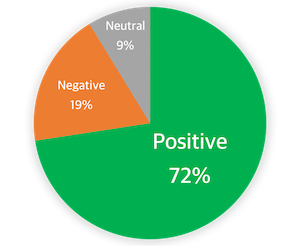Help support A Way with Words broadcasts and podcasts by making a donation now. |
| Dear friends,
Last week we sent out a simple survey to tens of thousands of A Way with Words listeners and fans. Our goal: to find out your consensus on the state of the English language: negative, positive or neutral? We said we’d wait a few weeks to reveal the results. But why wait? We have an answer!
That makes us so happy! Here’s why: our primary goal has been to change the way our listeners — you included — talk and think about language, including grammar, dialect, new words, and more. We’re trying to get you to:
If that sounds like something you can get behind (and we know it is — we have the poll results now!) add your voice to ours by giving to support the program today. Let’s see if, together, we can convince the 28% who voted “neutral” or “negative” in the survey that there’s no reason to worry — English is on a great path and we’ll show you the way. Best wishes,
Martha Barnette and Grant Barrett, |
 |
Further reading
The words tough, through, and dough all end in O-U-G-H. So why don’t they rhyme? A lively new book addresses the many quirks of English by explaining the history of words and phrases. And: have you ever been in a situation where a group makes...
A librarian opens a book and finds a mysterious invitation scribbled on the back of a business card. Another discovers a child’s letter to the Tooth Fairy, tucked into a book decades ago. What stories are left untold by these forgotten...



 The results were very positive! Seventy-two percent positive! That’s great! That means a large majority of you clicked on the button for “The English language has wonderful diversity! We should find delight in and learn more about its ever-changing features.”
The results were very positive! Seventy-two percent positive! That’s great! That means a large majority of you clicked on the button for “The English language has wonderful diversity! We should find delight in and learn more about its ever-changing features.”


